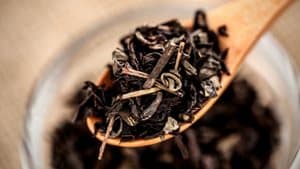
Melatonin is my favorite hormone, as well as a supplement. Why? Because it does not just help manage anxiety and depression(via helping secreted brain chemicals) but also helps mitochondrial functions and slows down the aging process.
Research shows that blue light exposure after sunset can disrupt circadian rhythms and decrease natural melatonin production, which can increase your risk of diabetes and cancer.
Light pollution in cities has become ten times more intense over the past 30 years, and our testosterone levels are half what they used to be. There is a relationship. The right thing to do is to darken cities at night so humans and other animals can all get proper sleep. It will save our insects and, ultimately, our soil. If your light is not red at night, turn it off. Birds and other nocturnal animals will thank you.
– Dave Asprey
How About the Caffeine? Does Melatonin Counteract Caffeine?
Yes, Caffeine might be.
It’s not just about artificial blue light exposure; excessive Caffeine can reduce potential harm to Melatonin production.
Yet, some research shows that caffeine can significantly lower melatonin levels in humans on the day of administration.
In this article, I will cover all aspects of optimizing Melatonin and knowledge about Caffeine.
Effects Of Caffeine On The Human Internal Body Clock
The circadian system(Body Clock) regulates sleep-wake cycles and other physiological and behavioral activities such as digestion and sleep. This is an important process for our physical as well as mental health.
Caffeine is not evil, but it’s not “the best friend” for optimizing sleep and anxiety because they actually have opposite effects. Caffeine can be a stimulant, but melatonin is the opposite effect.
It is also supported by science because the research showed that chronic caffeine consumption lengthens the circadian period of molecular oscillations in vitro primarily via an adenosine receptor/cyclic AMP-dependent mechanism.
Finally, the consumption of caffeine was found to result in a reduction in the quality of sleep as well as the release of melatonin, the primary hormone that regulates sleep. This most commonly occurs when caffeine is taken at night. (affecting REM sleep)
But don’t be sad. You can still drink coffee. Sleep is not affected by Coffee, but it is affected by Caffeine itself. I mean, there is tons of decaffeine Caffeine, that same taste as regular but is even beneficial.
Do you know that circadian rhythm impack our mood? An irregular circadian rhythm can have a negative effect on a person’s number of health problems, including mood disorders such as depression, anxiety, bipolar disorder, and seasonal affective disorder.
Caffeine Lower GABA Level, Which Another Factors Affective Our Sleep Cycle

There is another reason. Caffeine can impact our sleep cycle as well as quality. It increases Glutamate, which is responsible for alertness and focus but negatively impacts our GABA level, which is responsible for relaxation and calmness.
GABA has undervalued anti-anxiety brain chemicals people are not aware of that. Regardless of Caffeine, particular people tend to have more deficiency of GABA because of gene mutation and Gut problems (lactobacillus rhamnosus deficiency).
Without enough GABA, you will produce glutamate(the amino acid when too much, which causes you to overthink and anxious behavior)
Anxiety directly impacts our sleep cycle because how can you get sleep while overthinking?
The problem is that Caffeine actually lowers GABA, and the research found that Caffeine has been found to suppress the inhibitory (GABAergic) activity and modulate GABA receptors.
Another research shows that reduced GABA activity has been associated with insomnia and poor sleep, and I believe that without enough GABA receptors, we tend to have more overthinking states.
This is actually “bad news” if you already have anxiety and panic disorder.
Related: Relaxing and Focusing: GABA and Glutamate in the Human Brain
Additionally, caffeine has been found to suppress the inhibitory (GABAergic) activity and modulate GABA receptors. Studies have also found that modulating these neurotransmitters leads to neurobehavioral effects.
Source- https://www.ncbi.nlm.nih.gov/pmc/articles/PMC7132598
Caffeine Spike Cortisol Which Suppresses Melatonin
Cortisol isn’t evil, but an excessive amount might be.
When it comes to sleep, Cortisol and Melatonin are not best friends too, and Caffeine directly impacts and spikes cortisol levels in individuals.
Human studies suggest that Caffeine raises resting cortisol and epinephrine levels, similar to acute stress. This secretion might be helpful for dopamine production and improve mood in the short term, but in the long term, it’s not worth it if it’s an excessive amount because you might feel like you can’t get sleep. Right?
What does that mean? Explain more!
The problem is that you will lose long-term circumstances when short-term mood enchantment can get a place. It’s like an investment.
Exchanging your sleep quality with short-term pleasure might not be good for the long-term impact on your brain chemicals.
So, you lose your “enjoyment brain chemicals,” or “dopamine,” or “serotonin,” choosing the short-term “dopamine rush” coming from Caffeine. Lack of sleep certainly impacts long-term Dopamine, Serotonin, and other brain chemicals secretion.
And when melatonin levels are high, cortisol levels should be low, and vice versa. When one of these is out of whack, it disrupts our ability to rest at night.
Another reason it would be best to lower the intake of Caffeine is that it increases the change in a loss of B vitamins, specifically B1 and thiamine. This might make us feel tired, anxious, and fatigued.
What Should You Do? Eliminating Coffee Or Tea?

No, a low amount of Caffeine influences protection effects against dopaminergic neuronal loss and increases new brain formation through BDNF production, suggesting that Caffeine may have therapeutic activity against neurodegenerative diseases, such as Parkinson’s disease.
For that, you will not need to avoid Caffeine completely. However, I suggest limiting our Caffeine consumption daily to 50 to 100 mg if you have anxiety problems and avoiding it at night.
To even help anxiety and stress, you can drink Black Tea is the best choice because it feeds probiotics bacteria in the gut, tastes better, and it has L-theanine, which supports GABA and Alpha-brain waves.
Another thing you can consider that High-Quality Polyphenol rich Decaffeine Caffeine.
This is great, and the research showed that Coffee polyphenols like chlorogenic acids have antioxidant, anti-inflammatory, anti-cancer, anti-diabetes, and antihypertensive effects. (no matter whether decaffeinated or not)
Tips: For reducing the Caffeine jittery effect, try to use “Taurine, L-Theanine, And Magnesium” to lower “caffeine anxiety.” and better sleep.
Related: Anxiety 101: The Essential Guide to Lower Your Anxiety
For Optimizing Melatonin, Moderate Caffeine.
As we learned, Melatonin is the sleep hormone responsible for regulating the sleep circle.
Long before, thanks to technology, people could not find that “hormone supplement.” But for, we have possible to find that. This hormone’s unique properties. Why do I like optimizing melatonin?
This hormone is crucial because Melatonin has a neuroprotective effect against amyloid b1 neurotoxicity by decreasing memory impairment and anxiety, as well as protective properties of mitochondria, which improves longevity and health.
On the other hand, Caffeine itself suppresses Melatonin production. For that, avoid Caffeine.
Another thing is that you can optimize your Melatonin, lowering EMF Exposure and Artificial Blue Light at night.
Related: Melatonin Supplements: Can They Make You Nervous?
EMF Exposure And Melatonin
Caffeine and Blue Light are not only enemies when it comes to Melatonin; there is also another one called:” EMF (Electric and magnetic fields).” This is a big deal because there is something you can not see, but it impacts your overall well-being, causes anxiety and depression, and inhibit melatonin production. It’s like we are fighting with ghosts.
People are starting to get affected by EMF, and insomnia is one of the most prevalent complaints reported by persons recently exposed to EMFs. Extremely low-frequency EMFs (emitted by power plants and electric wire) 18 and radio-frequency EMFs (emitted by cell phones 19,20) have been found to disrupt sleep.
- EMFs stimulate the brain’s “ cortical areas,” which makes it difficult to relax and fall asleep.
- Also, there are some studies research on people who found to the research that nonionizing radiation lowers can detrimentally affect melatonin levels.
The problem is that you can’t completely eliminate EMF exposure, but you can reduce the exposure by just closing the Smartphones and Electronic devices before bed and trying to ground daily. This is a deep subject, and I would suggest you research that.
Pineal Gland Health Depends On Limiting Fluoride Exposure.
The pineal gland is the secret place because, in the Western, they believe it’s for the production of Melatonin and even DMT. But in the Eastern, it’s actually men’s second sexual gland which is responsible for “brain orgasm.”
However, back to the subject, we are becoming more aware that harmful chemical exposure from the environment can directly affect the health of our hormones and well-being.
Some kinds of heavy metals, such as “fluoride,” can impact melatonin production and pineal gland health.
According to National Research Council research, fluoride will affect pineal gland function, reduce melatonin synthesis, and lead to sleep problems like Caffeine.
Plus, excess Flouride could damage the pineal gland(Melatonin is the only known hormone synthesized by the pineal gland, and DMT(Soul hormone)
Limit the amount of fluoride you expose for the optimum pineal gland.
Outline
We can’t ignore that Caffeine itself can have some benefits, especially because it helps moods, prevent depression, and suppresses hunger. Plus, According to Andrew Huberman, combining it with L-tyrosine and Caffeine acts as a dopamine booster.
But, some people tend to have sensitivity to Caffeine more than others; if so, it will lead to a problem such as inhibiting Melatonin, spiking Cortisol, and even depleting Magnesium levels if it’s under control.
For that, always limit your Caffeine intake. Try to optimize your GABA level, and avoid Caffeine at night.